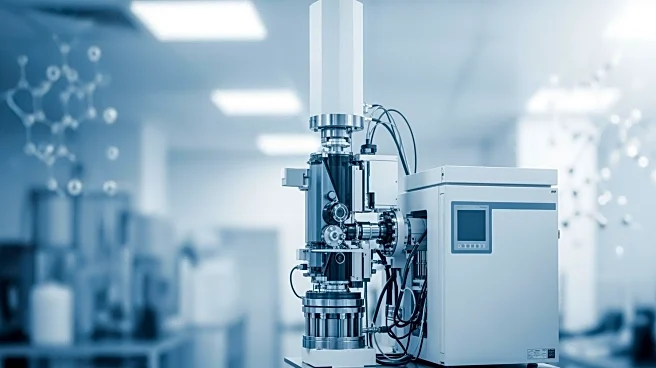What's Happening?
MilliporeSigma, the Life Science business of Merck KGaA in the U.S. and Canada, has announced a definitive agreement to acquire the chromatography business of JSR Life Sciences. This acquisition aims to expand
MilliporeSigma's downstream processing portfolio with advanced Protein A chromatography capabilities, which are crucial for the efficient and scalable production of biopharmaceutical therapies, including monoclonal antibodies. The transaction is expected to close by the end of the second quarter of 2026. JSR Life Sciences' chromatography business, based in Belgium, employs over 50 people and provides chromatography solutions to pharmaceutical and biotech manufacturers globally. The acquisition will integrate JSR's Protein A expertise with MilliporeSigma's existing portfolio, enhancing the speed, efficiency, and reliability of antibody therapy production.
Why It's Important?
The acquisition of JSR Life Sciences' chromatography business by MilliporeSigma is significant for the biopharmaceutical industry, particularly in the production of monoclonal antibodies. These antibodies are essential in treating various diseases, including cancer and autoimmune disorders. By enhancing its Protein A chromatography capabilities, MilliporeSigma can offer more efficient solutions to accelerate the development and market entry of these therapies. This move underscores Merck KGaA's commitment to investing in long-term bioprocessing technologies, potentially benefiting pharmaceutical companies and patients by improving access to advanced treatments. The integration of JSR's technologies could lead to increased global impact and customer confidence in therapy production.
What's Next?
Following the acquisition, MilliporeSigma is expected to focus on integrating JSR Life Sciences' Protein A technologies into its existing platform. This integration will likely involve strategic planning to optimize the combined resources and expertise for enhanced biopharmaceutical production. Stakeholders, including pharmaceutical companies and biotech manufacturers, may anticipate improved processing solutions and faster therapy development timelines. The acquisition may also prompt competitive responses from other industry players seeking to bolster their own bioprocessing capabilities. As the transaction progresses, regulatory approvals and operational adjustments will be key factors in the successful completion and implementation of the acquisition.
Beyond the Headlines
The acquisition highlights the growing importance of advanced bioprocessing technologies in the pharmaceutical industry. As demand for monoclonal antibodies and other biopharmaceuticals increases, companies are investing in innovative solutions to meet production challenges. This trend may lead to further consolidation in the industry, with larger firms acquiring specialized businesses to enhance their technological capabilities. Additionally, the focus on Protein A chromatography reflects the critical role of purification processes in ensuring the quality and efficacy of biopharmaceutical products. The long-term impact of such acquisitions could include accelerated drug development and improved patient outcomes.











